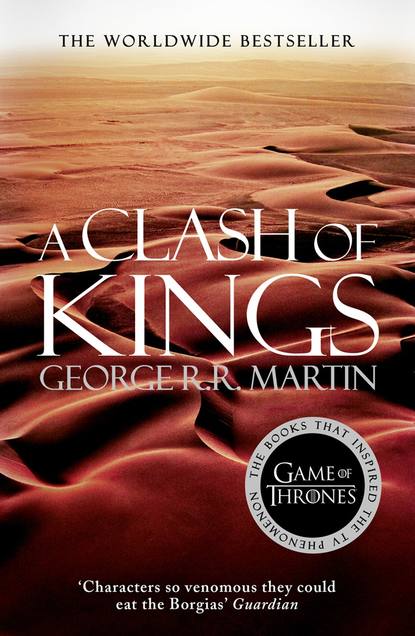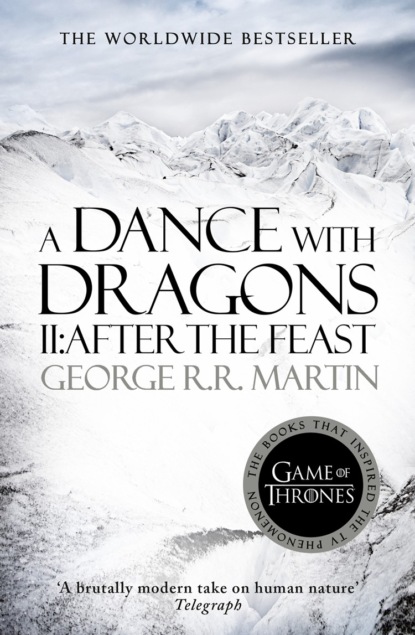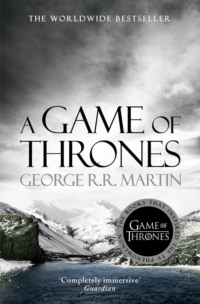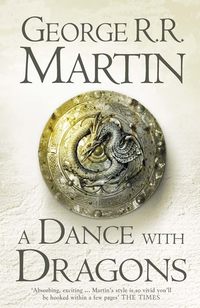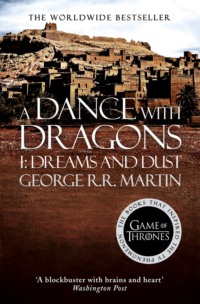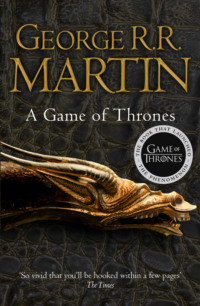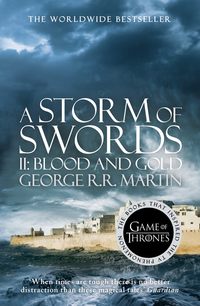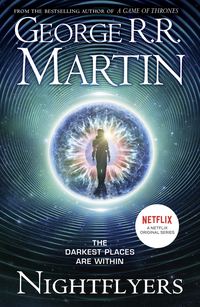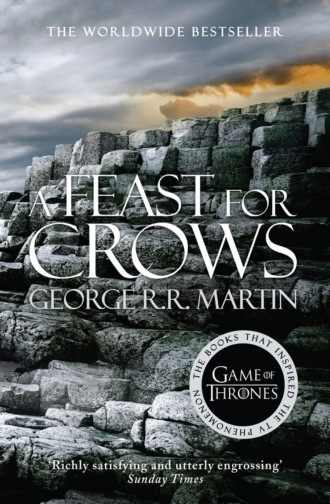
Полная версия
A Feast for Crows

GEORGE R.R. MARTIN
A FEAST FOR CROWS
BOOK FOUR OF
A Song of Ice and Fire

Copyright
HarperVoyager
An imprint of HarperCollinsPublishers
1 London Bridge Street
London SE1 9GF
www.harpervoyagerbooks.com
Previously published in paperback by Voyager in 2006, 2011
First published in Great Britain by Voyager in 2005
Copyright © George R.R. Martin 2005
Cover layout design © HarperCollinsPublishers Ltd 2014. HBO and related service marks are the property of Home Box Office, Inc.
Cover photographs © Garry Owens / Gallery Stock; Shutterstock.com (sky)
George R.R. Martin asserts the moral right to be identified as the author of this work
A catalogue record for this book is available from the British Library
This novel is entirely a work of fiction. The names, characters and incidents portrayed in it are the work of the author’s imagination. Any resemblance to actual persons, living or dead, events or localities is entirely coincidental.
All rights reserved under International and Pan-American Copyright Conventions. By payment of the required fees, you have been granted the non-exclusive, non-transferable right to access and read the text of this e-book on-screen. No part of this text may be reproduced, transmitted, down-loaded, decompiled, reverse engineered, or stored in or introduced into any information storage and retrieval system, in any form or by any means, whether electronic or mechanical, now known or hereinafter invented, without the express written permission of HarperCollins.
Source ISBN: 9780002247436
Ebook Edition © April 2012 ISBN: 9780007369218
Version: 2017-09-04
Dedication
for Stephen Boucher wizard of Windows, dragon of DOS without whom this book would haven been written in crayon
MAPS





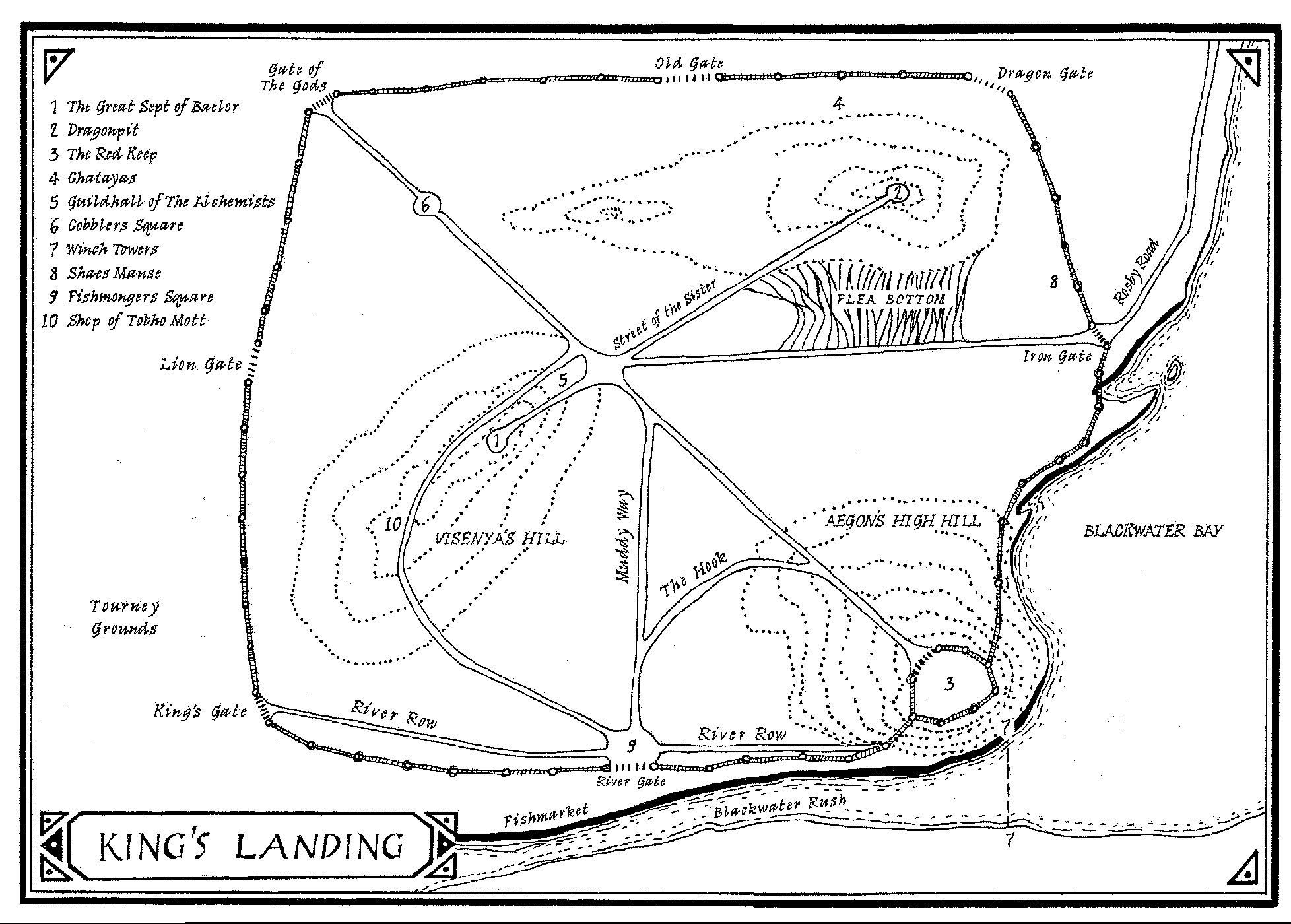
PROLOGUE
“Dragons,” said Mollander. He snatched a withered apple off the ground and tossed it hand to hand.
“Throw the apple,” urged Alleras the Sphinx. He slipped an arrow from his quiver and nocked it to his bowstring.
“I should like to see a dragon.” Roone was the youngest of them, a chunky boy still two years shy of manhood. “I should like that very much.”
And I should like to sleep with Rosey’s arms around me, Pate thought. He shifted restlessly on the bench. By the morrow the girl could well be his. I will take her far from Oldtown, across the narrow sea to one of the Free Cities. There were no maesters there, no one to accuse him.
He could hear Emma’s laughter coming through a shuttered window overhead, mingled with the deeper voice of the man she was entertaining. She was the oldest of the serving wenches at the Quill and Tankard, forty if she was a day, but still pretty in a fleshy sort of way. Rosey was her daughter, fifteen and freshly flowered. Emma had decreed that Rosey’s maidenhead would cost a golden dragon. Pate had saved nine silver stags and a pot of copper stars and pennies, for all the good that would do him. He would have stood a better chance of hatching a real dragon than saving up enough coin to make a golden one.
“You were born too late for dragons, lad,” Armen the Acolyte told Roone. Armen wore a leather thong about his neck, strung with links of pewter, tin, lead, and copper, and like most acolytes he seemed to believe that novices had turnips growing from their shoulders in place of heads. “The last one perished during the reign of King Aegon the Third.”
“The last dragon in Westeros,” insisted Mollander.
“Throw the apple,” Alleras urged again. He was a comely youth, their Sphinx. All the serving wenches doted on him. Even Rosey would sometimes touch him on the arm when she brought him wine, and Pate had to gnash his teeth and pretend not to see.
“The last dragon in Westeros was the last dragon,” said Armen doggedly. “That is well known.”
“The apple,” Alleras said. “Unless you mean to eat it.”
“Here.” Dragging his clubfoot, Mollander took a short hop, whirled, and whipped the apple sidearm into the mists that hung above the Honeywine. If not for his foot, he would have been a knight like his father. He had the strength for it in those thick arms and broad shoulders. Far and fast the apple flew …
… but not as fast as the arrow that whistled after it, a yard-long shaft of golden wood fletched with scarlet feathers. Pate did not see the arrow catch the apple, but he heard it. A soft chunk echoed back across the river, followed by a splash.
Mollander whistled. “You cored it. Sweet.”
Not half as sweet as Rosey. Pate loved her hazel eyes and budding breasts, and the way she smiled every time she saw him. He loved the dimples in her cheeks. Sometimes she went barefoot as she served, to feel the grass beneath her feet. He loved that too. He loved the clean fresh smell of her, the way her hair curled behind her ears. He even loved her toes. One night she’d let him rub her feet and play with them, and he’d made up a funny tale for every toe to keep her giggling.
Perhaps he would do better to remain on this side of the narrow sea. He could buy a donkey with the coin he’d saved, and he and Rosey could take turns riding it as they wandered Westeros. Ebrose might not think him worthy of the silver, but Pate knew how to set a bone and leech a fever. The smallfolk would be grateful for his help. If he could learn to cut hair and shave beards, he might even be a barber. That would be enough, he told himself, so long as I had Rosey. Rosey was all that he wanted in the world.
That had not always been so. Once he had dreamed of being a maester in a castle, in service to some open-handed lord who would honor him for his wisdom and bestow a fine white horse on him to thank him for his service. How high he’d ride, how nobly, smiling down at the smallfolk when he passed them on the road …
One night in the Quill and Tankard’s common room, after his second tankard of fearsomely strong cider, Pate had boasted that he would not always be a novice. “Too true,” Lazy Leo had called out. “You’ll be a former novice, herding swine.”
He drained the dregs of his tankard. The torchlit terrace of the Quill and Tankard was an island of light in a sea of mist this morning. Downriver, the distant beacon of the Hightower floated in the damp of night like a hazy orange moon, but the light did little to lift his spirits.
The alchemist should have come by now. Had it all been some cruel jape, or had something happened to the man? It would not have been the first time that good fortune had turned sour on Pate. He had once counted himself lucky to be chosen to help old Archmaester Walgrave with the ravens, never dreaming that before long he would also be fetching the man’s meals, sweeping out his chambers, and dressing him every morning. Everyone said that Walgrave had forgotten more of ravencraft than most maesters ever knew, so Pate assumed a black iron link was the least that he could hope for, only to find that Walgrave could not grant him one. The old man remained an archmaester only by courtesy. As great a maester as once he’d been, now his robes concealed soiled smallclothes oft as not, and half a year ago some acolytes found him weeping in the Library, unable to find his way back to his chambers. Maester Gormon sat below the iron mask in Walgrave’s place, the same Gormon who had once accused Pate of theft.
In the apple tree beside the water, a nightingale began to sing. It was a sweet sound, a welcome respite from the harsh screams and endless quorking of the ravens he had tended all day long. The white ravens knew his name, and would mutter it to each other whenever they caught sight of him, “Pate, Pate, Pate,” until he wanted to scream. The big white birds were Archmaester Walgrave’s pride. He wanted them to eat him when he died, but Pate half suspected that they meant to eat him too.
Perhaps it was the fearsomely strong cider – he had not come here to drink, but Alleras had been buying to celebrate his copper link, and guilt had made him thirsty – but it almost sounded as if the nightingale were trilling gold for iron, gold for iron, gold for iron. Which was passing strange, because that was what the stranger had said the night Rosey brought the two of them together. “Who are you?” Pate had demanded of him, and the man had replied, “An alchemist. I can change iron into gold.” And then the coin was in his hand, dancing across his knuckles, the soft yellow gold shining in the candlelight. On one side was a three-headed dragon, on the other the head of some dead king. Gold for iron, Pate remembered, you won’t do better. Do you want her? Do you love her? “I am no thief,” he had told the man who called himself the alchemist, “I am a novice of the Citadel.” The alchemist had bowed his head, and said, “If you should reconsider, I shall return here three days hence, with my dragon.”
Three days had passed. Pate had returned to the Quill and Tankard, still uncertain what he was, but instead of the alchemist he’d found Mollander and Armen and the Sphinx, with Roone in tow. It would have raised suspicions not to join them.
The Quill and Tankard never closed. For six hundred years it had been standing on its island in the Honeywine, and never once had its doors been shut to trade. Though the tall, timbered building leaned toward the south the way novices sometimes leaned after a tankard, Pate expected that the inn would go on standing for another six hundred years, selling wine and ale and fearsomely strong cider to rivermen and seamen, smiths and singers, priests and princes, and the novices and acolytes of the Citadel.
“Oldtown is not the world,” declared Mollander, too loudly. He was a knight’s son, and drunk as drunk could be. Since they brought him word of his father’s death upon the Blackwater, he got drunk most every night. Even in Oldtown, far from the fighting and safe behind its walls, the War of the Five Kings had touched them all … although Archmaester Benedict insisted that there had never been a war of five kings, since Renly Baratheon had been slain before Balon Greyjoy had crowned himself.
“My father always said the world was bigger than any lord’s castle,” Mollander went on. “Dragons must be the least of the things a man might find in Qarth and Asshai and Yi Ti. These sailors’ stories …”
“… are stories told by sailors,” Armen interrupted. “Sailors, my dear Mollander. Go back down to the docks, and I wager you’ll find sailors who’ll tell you of the mermaids that they bedded, or how they spent a year in the belly of a fish.”
“How do you know they didn’t?” Mollander thumped through the grass, looking for more apples. “You’d need to be down the belly yourself to swear they weren’t. One sailor with a story, aye, a man might laugh at that, but when oarsmen off four different ships tell the same tale in four different tongues …”
“The tales are not the same,” insisted Armen. “Dragons in Asshai, dragons in Qarth, dragons in Meereen, Dothraki dragons, dragons freeing slaves … each telling differs from the last.”
“Only in details.” Mollander grew more stubborn when he drank, and even when sober he was bullheaded. “All speak of dragons, and a beautiful young queen.”
The only dragon Pate cared about was made of yellow gold. He wondered what had happened to the alchemist. The third day. He said he’d be here.
“There’s another apple near your foot,” Alleras called to Mollander, “and I still have two arrows in my quiver.”
“Fuck your quiver.” Mollander scooped up the windfall. “This one’s wormy,” he complained, but he threw it anyway. The arrow caught the apple as it began to fall and sliced it clean in two. One half landed on a turret roof, tumbled to a lower roof, bounced, and missed Armen by a foot. “If you cut a worm in two, you make two worms,” the acolyte informed them.
“If only it worked that way with apples, no one would ever need go hungry,” said Alleras with one of his soft smiles. The Sphinx was always smiling, as if he knew some secret jape. It gave him a wicked look that went well with his pointed chin, widow’s peak, and dense mat of close-cropped jet-black curls.
Alleras would make a maester. He had only been at the Citadel for a year, yet already he had forged three links of his maester’s chain. Armen might have more, but each of his had taken him a year to earn. Still, he would make a maester too. Roone and Mollander remained pink-necked novices, but Roone was very young and Mollander preferred drinking to reading.
Pate, though …
He had been five years at the Citadel, arriving when he was no more than three-and-ten, yet his neck remained as pink as it had been on the day he first arrived from the westerlands. Twice had he believed himself ready. The first time he had gone before Archmaester Vaellyn to demonstrate his knowledge of the heavens. Instead he learned how Vinegar Vaellyn had earned that name. It took Pate two years to summon up the courage to try again. This time he submitted himself to kindly old Archmaester Ebrose, renowned for his soft voice and gentle hands, but Ebrose’s sighs had somehow proved just as painful as Vaellyn’s barbs.
“One last apple,” promised Alleras, “and I will tell you what I suspect about these dragons.”
“What could you know that I don’t?” grumbled Mollander. He spied an apple on a branch, jumped up, pulled it down, and threw. Alleras drew his bowstring back to his ear, turning gracefully to follow the target in flight. He loosed his shaft just as the apple began to fall.
“You always miss your last shot,” said Roone.
The apple splashed down into the river, untouched.
“See?” said Roone.
“The day you make them all is the day you stop improving.” Alleras unstrung his longbow and eased it into its leather case. The bow was carved from goldenheart, a rare and fabled wood from the Summer Isles. Pate had tried to bend it once, and failed. The Sphinx looks slight, but there’s strength in those slim arms, he reflected, as Alleras threw a leg across the bench and reached for his wine cup. “The dragon has three heads,” he announced in his soft Dornish drawl.
“Is this a riddle?” Roone wanted to know. “Sphinxes always speak in riddles in the tales.”
“No riddle.” Alleras sipped his wine. The rest of them were quaffing tankards of the fearsomely strong cider that the Quill and Tankard was renowned for, but he preferred the strange, sweet wines of his mother’s country. Even in Oldtown such wines did not come cheap.
It had been Lazy Leo who dubbed Alleras “the Sphinx.” A sphinx is a bit of this, a bit of that: a human face, the body of a lion, the wings of a hawk. Alleras was the same: his father was a Dornishman, his mother a black-skinned Summer Islander. His own skin was dark as teak. And like the green marble sphinxes that flanked the Citadel’s main gate, Alleras had eyes of onyx.
“No dragon has ever had three heads except on shields and banners,” Armen the Acolyte said firmly. “That was a heraldic charge, no more. Furthermore, the Targaryens are all dead.”
“Not all,” said Alleras. “The Beggar King had a sister.”
“I thought her head was smashed against a wall,” said Roone.
“No,” said Alleras. “It was Prince Rhaegar’s young son Aegon whose head was dashed against the wall by the Lion of Lannister’s brave men. We speak of Rhaegar’s sister, born on Dragonstone before its fall. The one they called Daenerys.”
“The Stormborn. I recall her now.” Mollander lifted his tankard high, sloshing the cider that remained. “Here’s to her!” He gulped, slammed his empty tankard down, belched, and wiped his mouth with the back of his hand. “Where’s Rosey? Our rightful queen deserves another round of cider, wouldn’t you say?”
Armen the Acolyte looked alarmed. “Lower your voice, fool. You should not even jape about such things. You never know who could be listening. The Spider has ears everywhere.”
“Ah, don’t piss your breeches, Armen. I was proposing a drink, not a rebellion.”
Pate heard a chuckle. A soft, sly voice called out from behind him. “I always knew you were a traitor, Hopfrog.” Lazy Leo was slouching by the foot of the old plank bridge, draped in satin striped in green and gold, with a black silk half cape pinned to his shoulder by a rose of jade. The wine he’d dribbled down his front had been a robust red, judging from the color of the spots. A lock of his ash-blond hair fell down across one eye.
Mollander bristled at the sight of him. “Bugger that. Go away. You are not welcome here.” Alleras laid a hand upon his arm to calm him, whilst Armen frowned. “Leo. My lord. I had understood that you were still confined to the Citadel for …”
“… three more days.” Lazy Leo shrugged. “Perestan says the world is forty thousand years old. Mollos says five hundred thousand. What are three days, I ask you?” Though there were a dozen empty tables on the terrace, Leo sat himself at theirs. “Buy me a cup of Arbor gold, Hopfrog, and perhaps I won’t inform my father of your toast. The tiles turned against me at the Checkered Hazard, and I wasted my last stag on supper. Suckling pig in plum sauce, stuffed with chestnuts and white truffles. A man must eat. What did you lads have?”
“Mutton,” muttered Mollander. He sounded none too pleased about it. “We shared a haunch of boiled mutton.”
“I’m certain it was filling.” Leo turned to Alleras. “A lord’s son should be open-handed, Sphinx. I understand you won your copper link. I’ll drink to that.”
Alleras smiled back at him. “I only buy for friends. And I am no lord’s son, I’ve told you that. My mother was a trader.”
Leo’s eyes were hazel, bright with wine and malice. “Your mother was a monkey from the Summer Isles. The Dornish will fuck anything with a hole between its legs. Meaning no offense. You may be brown as a nut, but at least you bathe. Unlike our spotted pig boy.” He waved a hand toward Pate.
If I hit him in the mouth with my tankard, I could knock out half his teeth, Pate thought. Spotted Pate the pig boy was the hero of a thousand ribald stories: a good-hearted, empty-headed lout who always managed to best the fat lordlings, haughty knights, and pompous septons who beset him. Somehow his stupidity would turn out to have been a sort of uncouth cunning; the tales always ended with Spotted Pate sitting on a lord’s high seat or bedding some knight’s daughter. But those were stories. In the real world pig boys never fared so well. Pate sometimes thought his mother must have hated him to have named him as she did.
Alleras was no longer smiling. “You will apologize.”
“Will I?” said Leo. “How can I, with my throat so dry …”
“You shame your House with every word you say,” Alleras told him. “You shame the Citadel by being one of us.”
“I know. So buy me some wine, that I might drown my shame.”
Mollander said, “I would tear your tongue out by the roots.”
“Truly? Then how would I tell you about the dragons?” Leo shrugged again. “The mongrel has the right of it. The Mad King’s daughter is alive, and she’s hatched herself three dragons.”
“Three?” said Roone, astonished.
Leo patted his hand. “More than two and less than four. I would not try for my golden link just yet if I were you.”
“You leave him be,” warned Mollander.
“Such a chivalrous Hopfrog. As you wish. Every man off every ship that’s sailed within a hundred leagues of Qarth is speaking of these dragons. A few will even tell you that they’ve seen them. The Mage is inclined to believe them.”
Armen pursed his lips in disapproval. “Marwyn is unsound. Archmaester Perestan would be the first to tell you that.”
“Archmaester Ryam says so too,” said Roone.
Leo yawned. “The sea is wet, the sun is warm, and the menagerie hates the mastiff.”
He has a mocking name for everyone, thought Pate, but he could not deny that Marwyn looked more a mastiff than a maester. As if he wants to bite you. The Mage was not like other maesters. People said that he kept company with whores and hedge wizards, talked with hairy Ibbenese and pitch-black Summer Islanders in their own tongues, and sacrificed to queer gods at the little sailors’ temples down by the wharves. Men spoke of seeing him down in the undercity, in rat pits and black brothels, consorting with mummers, singers, sellswords, even beggars. Some even whispered that once he had killed a man with his fists.
When Marwyn had returned to Oldtown, after spending eight years in the east mapping distant lands, searching for lost books, and studying with warlocks and shadowbinders, Vinegar Vaellyn had dubbed him “Marwyn the Mage.” The name was soon all over Oldtown, to Vaellyn’s vast annoyance. “Leave spells and prayers to priests and septons and bend your wits to learning truths a man can trust in,” Archmaester Ryam had once counseled Pate, but Ryam’s ring and rod and mask were yellow gold, and his maester’s chain had no link of Valyrian steel.
Armen looked down his nose at Lazy Leo. He had the perfect nose for it, long and thin and pointed. “Archmaester Marwyn believes in many curious things,” he said, “but he has no more proof of dragons than Mollander. Just more sailors’ stories.”
“You’re wrong,” said Leo. “There is a glass candle burning in the Mage’s chambers.”
A hush fell over the torchlit terrace. Armen sighed and shook his head. Mollander began to laugh. The Sphinx studied Leo with his big black eyes. Roone looked lost.
Pate knew about the glass candles, though he had never seen one burn. They were the worst-kept secret of the Citadel. It was said that they had been brought to Oldtown from Valyria a thousand years before the Doom. He had heard there were four; one was green and three were black, and all were tall and twisted.
“What are these glass candles?” asked Roone.
Armen the Acolyte cleared his throat. “The night before an acolyte says his vows, he must stand a vigil in the vault. No lantern is permitted him, no torch, no lamp, no taper … only a candle of obsidian. He must spend the night in darkness, unless he can light that candle. Some will try. The foolish and the stubborn, those who have made a study of these so-called higher mysteries. Often they cut their fingers, for the ridges on the candles are said to be as sharp as razors. Then, with bloody hands, they must wait upon the dawn, brooding on their failure. Wiser men simply go to sleep, or spend their night in prayer, but every year there are always a few who must try.”
“Yes.” Pate had heard the same stories. “But what’s the use of a candle that casts no light?”
“It is a lesson,” Armen said, “the last lesson we must learn before we don our maester’s chains. The glass candle is meant to represent truth and learning, rare and beautiful and fragile things. It is made in the shape of a candle to remind us that a maester must cast light wherever he serves, and it is sharp to remind us that knowledge can be dangerous. Wise men may grow arrogant in their wisdom, but a maester must always remain humble. The glass candle reminds us of that as well. Even after he has said his vow and donned his chain and gone forth to serve, a maester will think back on the darkness of his vigil and remember how nothing that he did could make the candle burn … for even with knowledge, some things are not possible.”
Lazy Leo burst out laughing. “Not possible for you, you mean. I saw the candle burning with my own eyes.”
“You saw some candle burning, I don’t doubt,” said Armen. “A candle of black wax, perhaps.”


